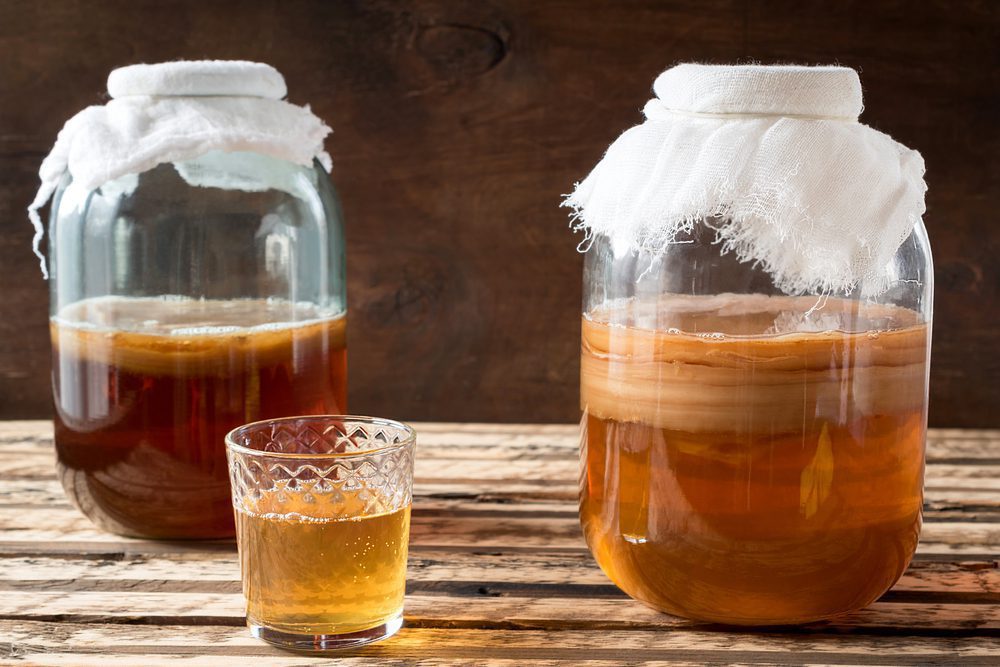Fermentation is the natural process through which carbohydrates are converted into alcohol or acids by microorganisms like yeast and bacteria. Fermentation causes the microorganisms to change the elements within fermented food, giving them extra nutritional value by boosting the number of beneficial bacteria, or probiotics, found in your gut.
This means that fermented foods are easier to digest and increase the availability of vitamins and minerals for your body to absorb. Additionally, probiotic-rich foods support your gut lining, so fermented foods benefit your immune system by making it more robust. Recent studies suggest fermented foods may help alleviate diarrhea, irritable bowel syndrome, and Crohn’s disease, as well as supporting your overall gut health, leading to living a longer life.
How are foods fermented?
Most foods are fermented naturally from the microorganisms found in the raw food or processing environment. For example, sauerkraut and kimchi come from soy which has microorganisms in it.

Other foods are fermented by adding starter cultures that initiate the fermentation. One way this can be done is by the natural process of “backslopping”, which is when a small amount of a previously fermented batch is added to the raw food. This is how sourdough bread is made. Commercial starters can also be added to the food in order to initiate fermentation.
What are some examples of fermented foods?
A common fermented food is probiotic yogurt, which is produced from milk that has been fermented. Yogurt is high in calcium, potassium, phosphorus, riboflavin, and vitamin B12. One review of 14 studies showed that probiotic yogurt could help reduce blood pressure; another study found that a higher intake of yogurt was linked to improvements in bone mineral density. Keep in mind that not all types of yogurt contain probiotics—look for ones that contain live cultures.
Another common fermented food is sourdough. Although it doesn’t contain probiotics like some other fermented foods, the fermentation still makes the nutrients found in the grains more available for absorption which benefits digestion. Sourdough also contains lower levels of fructans which is another substance that can cause unpleasant digestive symptoms for some people.
 A popular example of a fermented item as of late is kombucha, a fermented tea made from either green or black tea. Animal studies show that drinking kombucha could help prevent liver toxicity, and test-tube studies have found that it could help induce cancer cell death and block the spread of cancer cells.
A popular example of a fermented item as of late is kombucha, a fermented tea made from either green or black tea. Animal studies show that drinking kombucha could help prevent liver toxicity, and test-tube studies have found that it could help induce cancer cell death and block the spread of cancer cells.
Another fermented drink is apple cider vinegar. It contains probiotics and certain types of acids that also support the prebiotics in your gut. You can add one tablespoon of apple cider vinegar to a drink twice a day, or you can simply drink it straight up.
Fermenting soybeans with salt and koji creates miso, which is a common seasoning in Japanese cuisine. In a study involving 21,852 Japanese women, consuming miso soup was linked to a lower risk for breast cancer; a study of more than 40,000 people showed that a higher intake of miso soup was associated with a lower risk for stroke in Japanese women.
Sauerkraut is a popular condiment consisting of shredded cabbage that has been fermented by lactic acid bacteria. Sauerkraut contains lots of fiber, vitamin C, and vitamin K. It also has a good amount of lutein and zeaxanthin, two antioxidants that promote eye health and reduce the risk of eye disease.
Is there another option?
While these foods support your gut and overall health, they are not all easy to find at your local stores, and you may not want to eat one of these every day. Luckily, there is a better option: fermented vitamins and supplements.

Photo Credit: New Chapter
For example, New Chapter’s fermentation technology transforms vitamins, minerals, and herbs into fermented multivitamins. It breaks down the nutrients so they are pre-digested, allowing your body to unlock all of their benefits when you consume them. Their vitamins and supplements provide you with all of the health benefits of fermented foods without having to figure out where to buy them or how to prepare them.
Discover more about fermented supplements on Tomorrow’s World Today’s presentation of “The Science Behind Supplements” streaming NOW on Science Channel GO and Discovery GO!




